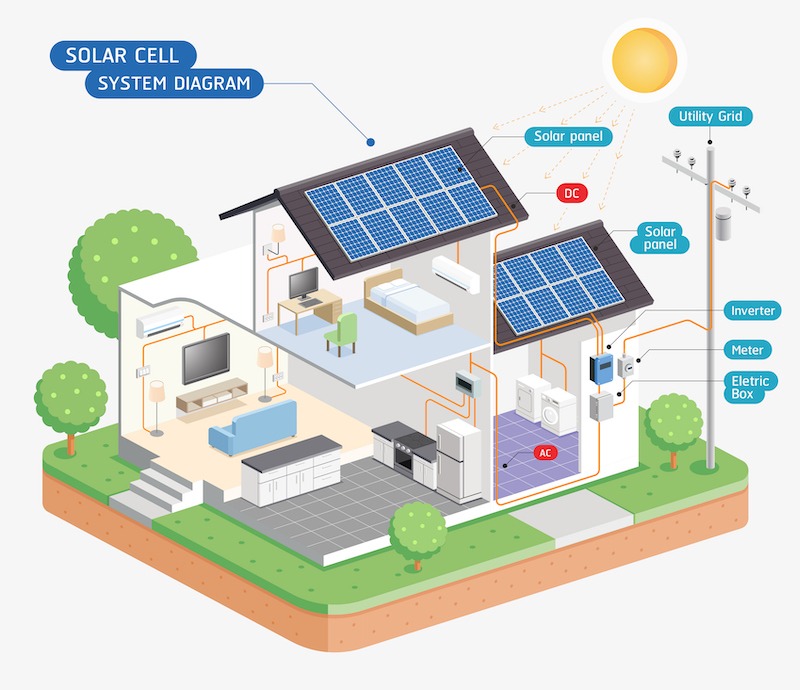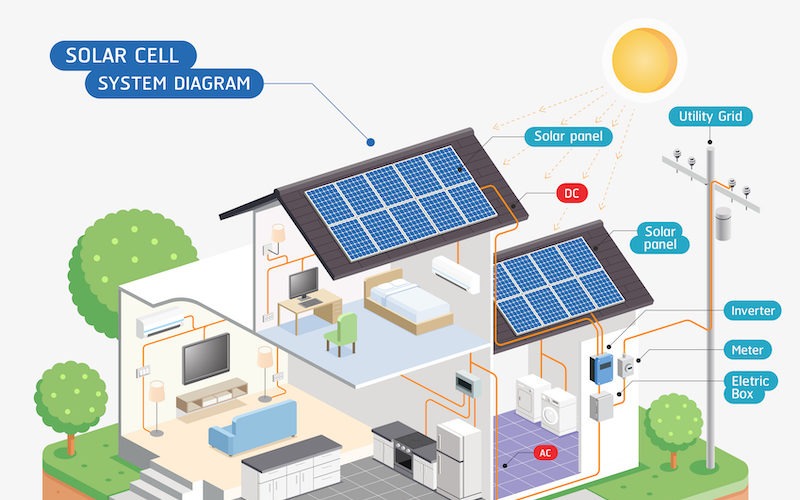There are many advantages to installing a home energy system in your home. The latest solar panel energy technology will not just save you money by cutting your electricity bill, but also contribute to a cleaner world.
By relying on the clean energy technology of solar panels, your family can look forward to reducing your electrical consumption and slashing your power bills.
A solar power system is designed to convert sunlight to energy. The main benefits of installing a solar system include:
- Reducing the cost of electricity
- Having a source of power to your home in the event of a power outage
- Reducing your carbon footprint
- Adding value to your property
- Receiving financial compensation for extra electricity going back into the power grid
How home solar energy systems work
Solar panels capture sunlight and converting this into Direct Current, or DC.
This Direct Current moves to an Inverter which converts the direct current it receives to Alternate Current or AC. This is electricity which can be used around the home.

Image source: istockphoto
Modern Inverters are created to get maximum energy production. Unlike older versions, the current generation of solar energy systems can continue to function even if one solar panel is not operating.
The AC (electricity) produced in an Inverter can be used to power home appliances and electronics such as the TV, computers, fridge and cooktops, lighting and air-conditioning and heating.
Today, slimline solar energy storage batteries are available. They make a smart choice for families who want to capitalise on their solar panel investment.
By using battery storage there is no wastage of excess electricity.
The electricity not used in your home is stored for later use. If the battery becomes full, excess power is sent back to your local power grid, and you are compensated at a set rate per kilowatt. And all the while, your solar panels continue to generate more electricity for your home to use.
Two Major Considerations
Interested in joining the millions of others that harness the natural power of the sun and use solar technology as a sustainable energy source in your home?
For everyone that makes a major purchase for their home, they must always balance the major considerations of cost versus quality. For every family, this will determine if installing a household solar power system is the right choice.
The Cost Issue
There is no doubt that installing a complete solar energy system is not cheap. And it is not something you should DIY. If you are building a new home, talk to your property developer about including a solar energy system as part of the design.
When done professionally, a high-quality solar system will add value to your property. But the cost of installation will be thousands.
To reduce this cost many governments, offer rebates. Installation companies also offer payment plans.
Do your research.
While these rebates or plans may not offset the cost of the installation immediately, an efficient solar panel system is definitely a cost-saving feature for your home.
Solar panels help homeowners save money immediately and in the long-term.
- Immediately using a residential solar system will reduce the household power bill and avoid purchasing power from the local electricity grid.
- In the long-term, having solar panels also protects the homeowner from rising electricity costs. It is also an added feature that will improve your property’s value.
The Quality
The cost of installing a home solar system is an issue for many families. As with most things in life, price dictates quality.
There is no doubt that choosing high power-output solar energy panels will create maximum energy output. Which means more electricity.
The energy technology industry moves fast. Always check that you are being sold the latest quality solar panels and that they comply with the current industry standards.
Remember, to create a high power-output solar energy system, you need high-performing solar energy products.
These are the key factors to consider when comparing solar panels:
- Suitability for residential application
- Energy yields
- Stringent testing (including internal testing) for high-performance
- Reliability
- The durability of solar materials that will save on repair costs
- Long warranty periods that offer peace of mind for repairs and replacement
- Performance efficiency even in the shade
- Weather resistance, especially if you live in an area prone to frost, sand or even hail
- Suitability for your roof (i.e. sloping or non-sloping)
- Materials used to build the panels
Weighing up the Value
Once you ascertain what solar panels are best suited to your home environment, it becomes a matter of weighing up the initial cost with any government rebates and your expected benefits.
Research is clear that by harvesting energy for the sun, a home solar energy system will save you money long-term and reduce reliance on the electricity grid. This and the environmental good you are doing the planet might also be a factor in your decision.
If you do decide to install a solar energy system, make sure you get the most out of your solar technology.
Talk to a local expert or your property developer for appropriate advice and correct installation.

